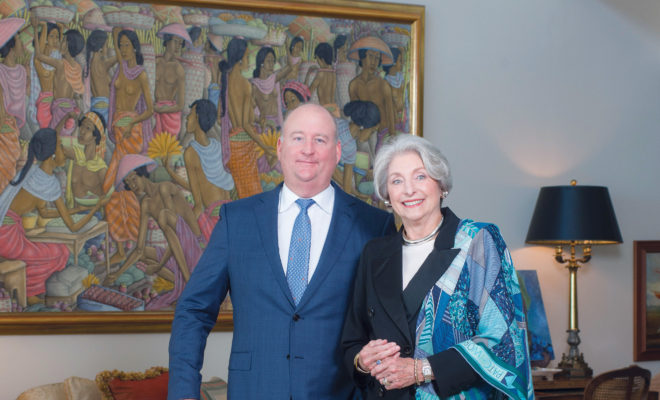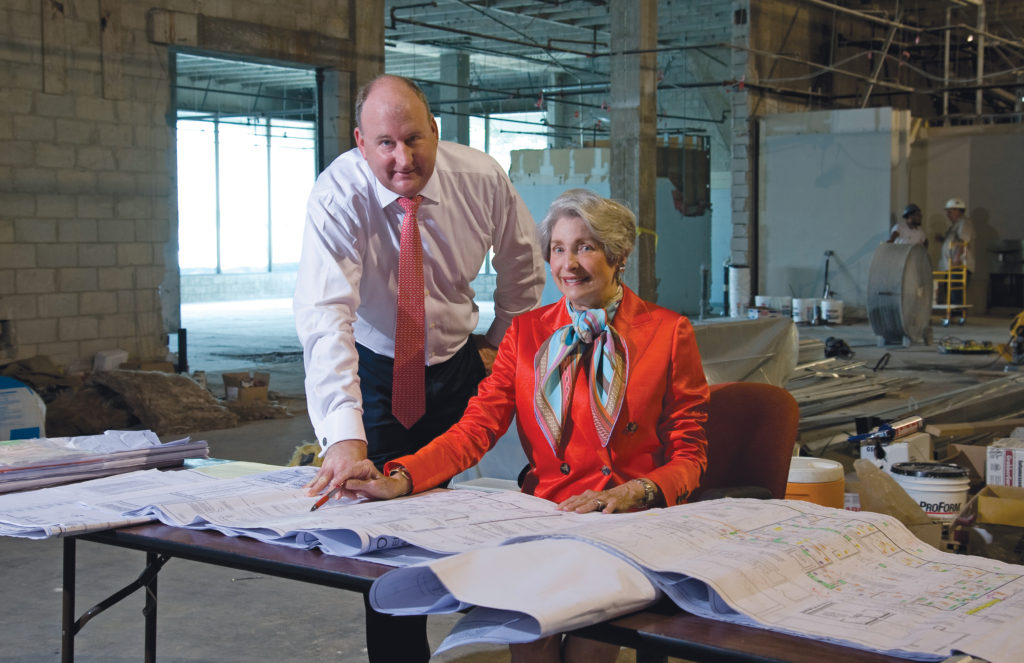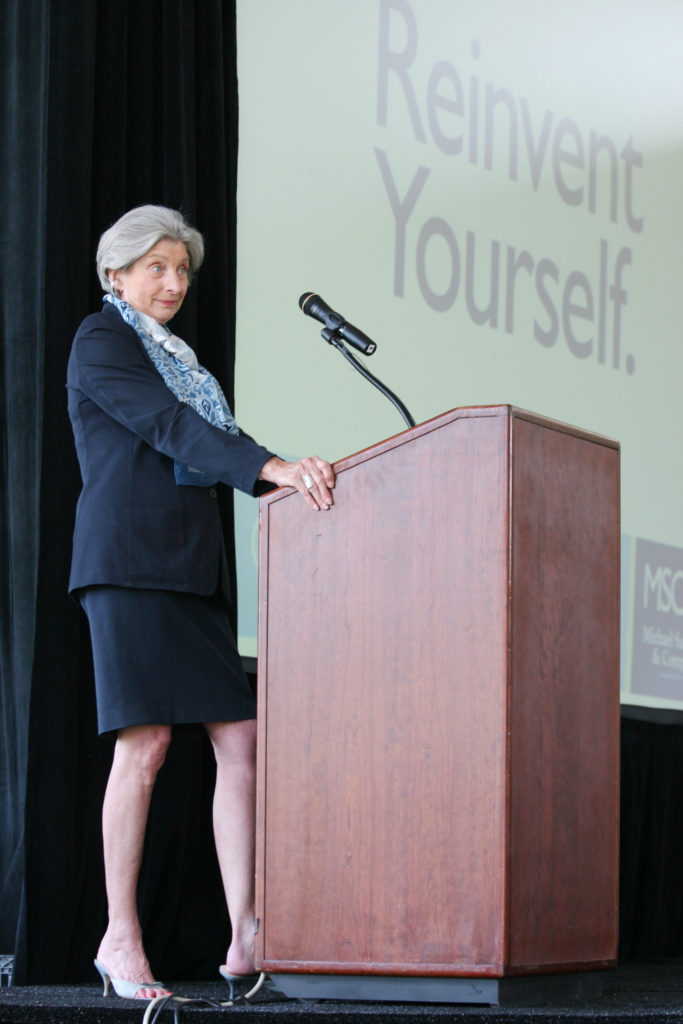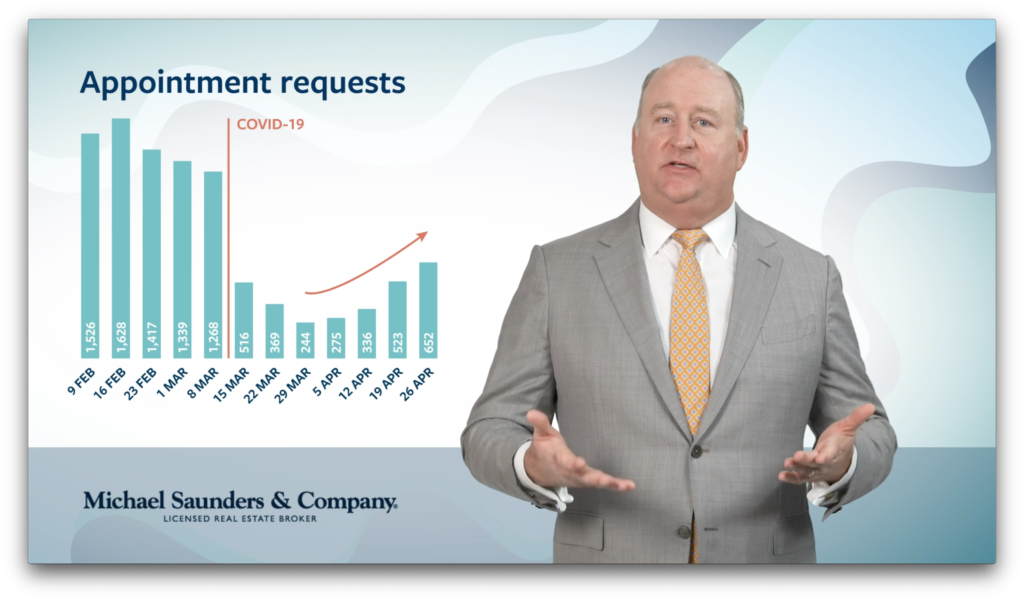
People
Spotlight: Weathering the Storms
Michael Saunders and son Drayton Saunders share how their company is dealing with the challenges of buying and selling real estate during a global pandemic.
By Gus Mollasis
Local real estate is synonymous with her iconic name. It’s been that way since Michael Saunders started from a modest St. Armands office in 1976 and now, nearly 45 years later, her name is proudly displayed on 23 offices on the Gulf Coast.
She has weathered every real estate storm and come out on the other side – standing taller, stronger and better than before – while always keeping her legendary real estate entity Michael Saunders & Company in good shape. From two recessions with very high interest rates in the 80s, the savings and loan crisis of the 90s, the dot-com bubble, the 9/11 terrorist attacks, and the housing and banking meltdown of 2008, Michael Saunders’ piercing blue eyes have seen it all.
So, when the Covid-19 worldwide pandemic hit, it was a pretty good bet that it would be the virus and not this venerable lady that would blink at the challenges that lie ahead selling real estate on the Gulf Coast of Florida.
As I make my way past the masked receptionist at Michael Saunders downtown office, I’m greeted by a masked Michael Saunders and her son Drayton Saunders, the company’s president. As we social distance our way to a big table in the private board room, warm, polite salutations from a distance replace what would surely be during normal times hugs and handshakes on just another Tuesday morning.
To those not in the real estate industry, Tuesday is Caravan Day, a day that agents tour other agent’s listings, walk through to see what’s new, and profile a home that may fit a certain client’s needs. Caravan is a fundamental staple in the real estate business. It is how agents network themselves and their properties. A way for agents to connect. For Michael Saunders, caravans have always been a big part of her business. A business she’s built that’s all about connecting and cultivating relationships. And even with the mask on, you can see it in her eyes. No pandemic or virus in the world has a chance to get between Michael Saunders and her company and prevent them from safely connecting with the public.
Still doing caravans represent unique challenges because of CDC guidelines. Curious, I ask how they are conducting caravans at this time.
“Funny, you should ask,” Michael says smiling. “All sales meetings are now done by Zoom. It was always a huggy, feely meeting. Everyone would get together on Tuesday and we’d share great ideas and new listings. We had speakers. It was a time that they could talk about wants and needs. It was just a good way for the company to feel the commonality of culture and brand, and promote their new listings and really connect.”
“So that has been the hardest thing. There are many companies that have different business models and that’s not part of it. But that was our heart and soul. We very quickly had to turn our lens and find a way to perpetuate that to the best of our abilities considering the time we are in. Every manager has a Zoom account and does their own Tuesday morning meeting. Today was a combined meeting of the Siesta and Palmer Ranch offices and I was the guest. It’s hard to gauge how many people attended but there were four pages of Zoom. They’re muted. Participants can raise their hand and join in the conversation. I told them I missed our meetings, and I didn’t realize how much I missed them until I was looking at all of their faces. It’s that connectivity that no other company is doing. We’re creating cocktail parties and coffee chats in the morning.”
Drayton Saunders has been a guest in almost every meeting.
“In the last five weeks we have done 700 Zoom meetings as a company,” shares Drayton. “Technology has allowed us in this crisis to stay connected in a very unique environment where you would not have been able to do that two decades ago. Because this is just as much a crisis of mindset as it is in health crisis, and because without knowing every aspect of the health picture, the fear around this particular crisis I think is different. I wasn’t here in 9/11, but once you had protocol for TSA there was some control.”

Michael jumps in. “I think this is the absolute first thing that has been global. This is not just the United States. It is a global occurrence. When 9/11 happened or even when the housing crisis happened, I couldn’t get on the phone with our international affiliates and ask what was happening there and how they were dealing with it. But when China began to come out from the virus, I could ask them how they were able to open. So, through our connections and also through technology, we have the ability to Zoom with our colleague in Hong Kong living in tiny apartment because it’s so expensive and he and his wife are home schooling his child. And we’re connected.”
“This is really unlike anything we have ever seen. There’s no roadmap for the health part of it. Science doesn’t run on rails. It’s invisible. I just got my report back. I insisted on being tested. It was negative. That means that I was negative last Thursday. That doesn’t mean you can let your guard down.”
I then asked Michael and Drayton how they are handling open houses.
“We do virtual open houses,” says Michael. “We had never done a virtual open house in our lives. We’ve always encouraged open houses because the sellers always like it and it’s a good way for buyers to see a desired property in their area on a Sunday afternoon. For agents, it’s a great way to sell that house and also a good way to meet people.”
According to Michael, it was the Surgeon General who discouraged open houses even before the Florida Governor announced a stay in place order. The company has followed those guidelines in an effort to find a safe path for everyone.
A time of adjustment for sure where the business of selling homes strangely has been relegated, at least for a while, to working from home. The company quickly got everyone to work remotely as Michael frantically ordered thousands of dollars of supplies—disinfectants, masks, booties— fairly early on in anticipation of what was to be. It was everything they need looking forward to the future. “Safety is our number one priority,” she says.
Staff has now returned to work according to CDC guidelines and the Michael Saunders & Company offices are open to the public.
For Michael and her team, dealing with prior recessions and the tragedy of 9/11 was very different than dealing with this pandemic. For them, the housing crisis was emotional. During that time, the company started its rental division because people were losing their houses. There were heart wrenching stories of people who had overbought, who were over financed, who, according to Michael, “used their houses like a piggy bank, resulting in so many short sales and foreclosures.”
Before the pandemic struck, real estate in our market was quite strong. There were buyers and sellers and there still are. For Michael Saunders, the question today is how to make it happen.
I’m a storyteller, says Michael, so it’s about agents discussing the situation with the seller. How comfortable is the seller with people coming into the house, no matter what precautions you take? You can suit them up and put them in a mask, but a seller may still say they are uncomfortable. A small percentage of homes have been taken off the market. For those that remained on the market, we encourage agents to go into those homes and make a personal video. Just a walk through to show and tell people what you like about a particular listing. Was it the neighborhood? The spreading oak trees. People always walking dogs there. Now let’s go into 122 Oak Street and look how gracious the entry is. We wanted this personal touch and agent video, which leads to virtual open houses.”

“And while some may be hesitant to buy and sell now, it’s always a good time to connect with clients. Call your database. Call people you know and just ask them how they’re doing. Stay connected because this is what we all need. You’re not necessarily right now going to sell a house. Just stay connected. So that’s what all of our real estate associates did. We have sold things sight unseen. We have sold homes with a three hour face time call with the agent in the house and the buyer in Cincinnati. We have used technology and married it to the professionalism of an agent to make a house come alive for someone.”
Michael’s always an optimist and also a pragmatist when it comes to the protocols of real estate and the right way to do things in any market. From the start of the pandemic, potential buyers were physically looking at the properties if the seller and agent agreed and the buyer answered pertinent questions about their travel, especially to hot bed areas. Everyone wore masks and gloves and the agent went early to open all lights and doors, so no one touched anything.
Because in Florida real estate is considered an essential business, “there hasn’t been a restriction to physically touring a home,” according to Drayton. While a strange time, Drayton points out it’s a time not without opportunities.
“In some ways over the last six weeks, it’s the first time that technology was married with the other really important thing that’s a skill set in this business and that’s empathy,” says Drayton. “Before we never would have put technology in the empathy bucket. It’s just sort of tool to achieve an end. People looked at things online before. They Googled things. Maybe they looked at a 3-D virtual tour. But I really think that technology took the stage in achieving a different goal, which was helping us empathize with where people were emotionally while still wanting to move forward with their real estate goal. So, I think that merger showed a whole other side to the use of technology. A real ah-ha moment. We had a great speaker recently who framed this well.”
“Everybody is approaching this crisis from a different perspective. Some people are more focused on their financial well-being then they would be their health. Some people are more focused on their restriction of their freedoms in terms of wanting to get back to normal, and do things like go to a park, beach, or a movie. And some people are focused on their health. And that third component – health – has been the really important one for us to understand and service because the other two we are used to. Technology has helped us extend that ability to be empathetic to someone’s comfort level. We have shown houses completely virtually or we have shown them as a preamble for someone who says, ‘I don’t want to traipse through ten homes, I only really want to take the opportunity to see the one home in person that I’m focused on.’ In some ways there’s the narrowing of the funnel. We’ve done more virtually then we would have six weeks ago.”
“We’re using this time as a leadership team to look at what we invest in. Because we can’t just tweak what we did before, we have to rethink it, retool it and come out stronger and become our better self.”
— Michael Saunders
For Michael, it has always been the relationship piece that is the most important part of the real estate business. “For agents who have continued to build a relationship and trust, it’s easier for them to work with someone and build that relationship,” says Michael.
“Our agents have clients who’ve told them that they’re so tired of their four walls. And that as soon as they can get out, they want to buy something and list their house. They want something with a bigger garden or closer to a park where they can walk. Agents are telling them to walk through and video their house so they can look at it together and maybe make some of the changes they’ve been thinking about. Paint that bedroom from pink to white and get your house ready to put on the market. All during this we’ve had houses coming on the market.”
Then Michael shared some starting numbers. “I believe it was on February 27 we had 250 appointments made through our appointment center. Those are all broker calls. On April 3 we had only 30. It shows how the health part weighed most heavily. But since then we have been steadily building up again with 110 to 117 physical showings. And that is with protocol. If you don’t have a mask you can’t go. We tell potential buyers that the seller requires you to have a mask. It’s just like we require you to be prequalified to see a house.”
Drayton jumps in. “There are actually three parties to the protocol. There are the agents on both sides and their comfort level. There is the owner of the home – occupied or not. And then there’s the actual buyer who wants to see it, so you have to really be paying attention to each one of them. Usually it would be about the buyers and sellers and their needs and that’s important, but with the health protocol it actually applies to each one of those parties. And we have to be thinking about that.”
“You have some agents who don’t yet feel comfortable touring a home even at a six foot distance. What they will do is go to the home early. They will open it up, stage it and be ready to face time somebody. They’ll have the client go in and they’ll sit in their car telling them that if they have any questions, they can face time and the agent can narrate. It’s testing a lot of boundaries that you would not normally test in a crisis. Everyone wants to know when the market is coming back. In some ways the market is coming back in advance of our emotional comfort level with the crisis. And so, there’s this disconnect with the trend of the market and the trend of where people are emotionally.”
Buying and selling real estate is a forever changing business. A business that Michael Saunders and Drayton Saunders know a lot about. And today’s market conditions are much different from the banking crisis of 2008.
The two agree. “Back then it was a banking and real estate crisis.” Michael says, “Banking practices allowed people to buy homes that they shouldn’t have bought. No job. No Credit. No savings. No problem.”
Drayton adds, “The underlying issue is we had evaluation issues because of the fundamentals of that last boom, the lead up to the crisis. The fundamentals of the value of the home had gotten out of whack due because people were treating their homes like an ATM. The difference today is this is not a real estate related crisis and the overall stock of housing is still low and lower than what demand is of where we were in February when the stock market reached a high. We were dealing with a strong buyer’s market, trending to be a very aggressive start to the year in terms of buying behavior in a low inventory market across almost every price point.”
“So where are we today?” Drayton asks. “We’re trying to recover to a normal business pattern, in terms of pace of business. In terms of showings, those are people who are willing to go physically and see a home. We’re halfway from where we were and where we want to be.”
Michael says, “This is an interlude that is really tragic and frightening, but it doesn’t change the habits of buyers and sellers who want to transact business. It has given them pause and it happened all over the world. It moved from China to Italy across Europe to the United States and to Africa and to Brazil. This is so global. And that put everything on pause. And some states reacted differently. In New York real estate is not considered an essential business and you can’t go out and sell real estate. Here it’s considered essential. Yet some buyers and the sellers didn’t feel it was essential to have people come through their house. So, it’s the mindset of the consumer and I believe it will be with us for some time. It’s not something where we’ll be able to say on June 15 or July 15 there’s not another case because we continue to see cases. As a company, just as we did through all these other crises, we had to learn how to react as a company.”
How does the lady who has been an active force in Sarasota since 1976 see the public reacting and impacting Sarasota’s real estate market?
She believes that all the people in February who were out there looking at real estate and ready to buy still have the money. They still want to buy. And now Florida is even more attractive to those high tax states in the Northeast and Midwest.

“We have seen people moving here to establish residency from Illinois, New York, New Jersey because of the very high taxes. You combine that with those same people being in a condominium in Manhattan, Brooklyn, Queens, Chicago or in Minneapolis, or in a house where they have lockdowns. They’re saying whoa! Wait a minute! So all the national economists think that this is going to push people to make earlier decisions and they’re going to go to resort areas and rural areas where they have a different way of life where there can be social distancing and where you can still get out and walk and have clean air. As people continue to feel more comfortable, I think our area will continue to be even more attractive because of our clean air, the outdoors, the sprawl, and the opportunity to live on the water or out east.”
“I think every business has to assume until there’s an end you have to operate within that condition” says Drayton. If I were trying to run a business and said I’m just going to hold my breath until it’s over, I’m not going to change any of my habits and that was my attitude 45 days ago, then we wouldn’t have done virtual open houses or adapted to a new normal. Like every business, we’re asking how do we go back to doing business? Because there’s another piece of the puzzle— no one wants a health crisis to turn into an economic crisis.”
“During past recessions we came out of them with some of our greatest growth and best initiatives, says Michael. “We’re using this time as a leadership team to look at what we invest in. Because we can’t just tweak what we did before, we have to rethink it, retool it and come out stronger and become our better self.”
“It fills me with gratitude how the community has come together supporting first responders and helping those who have lost jobs. If they’ve had something to give— if it was money or their time—the generosity of those reaching out behind the scenes to help has humbled us all.”
Being a mother and son and responsible for heading one of the most successful and iconic real estate companies in the South does not complicate their lives, it clarifies it.
Whether conducting business together via a text, an email, a Zoom session, or the old fashion way of sitting across from each other in a board room or at the kitchen table, they will both tell you that they have never worked harder, remained more focused, tried to stay as positive and learned as much as they have in recent days.
“A crisis like this has you focused on what’s really important,” says Drayton. Going from here to there eats up a lot of quality time with the motion of doing. It teaches you to slow down. You can do more with less. And it teaches you to focus to be in the moment.”
Michael smiles and adds, “Drayton has a four year old. I adore both my grandchildren. More than a few times Drayton and I will exchange food that we have cooked. Recently he made a Bolognese and I made a garbanzo bean dish. We were exchanging the dishes in my driveway. His wife Kara was driving, and his little four-year-old Kinsley was in the back. She calls me Honey. She yells out to me, ‘Honey, I want to come in. But I can’t come into your house until the big germ is gone.”
In the end, it is after all, about the relationships that we build and cherish in our lives. And sometimes it just takes a four-year old to remind us what it’s all about as we weather life’s storms.



You must be logged in to post a comment Login